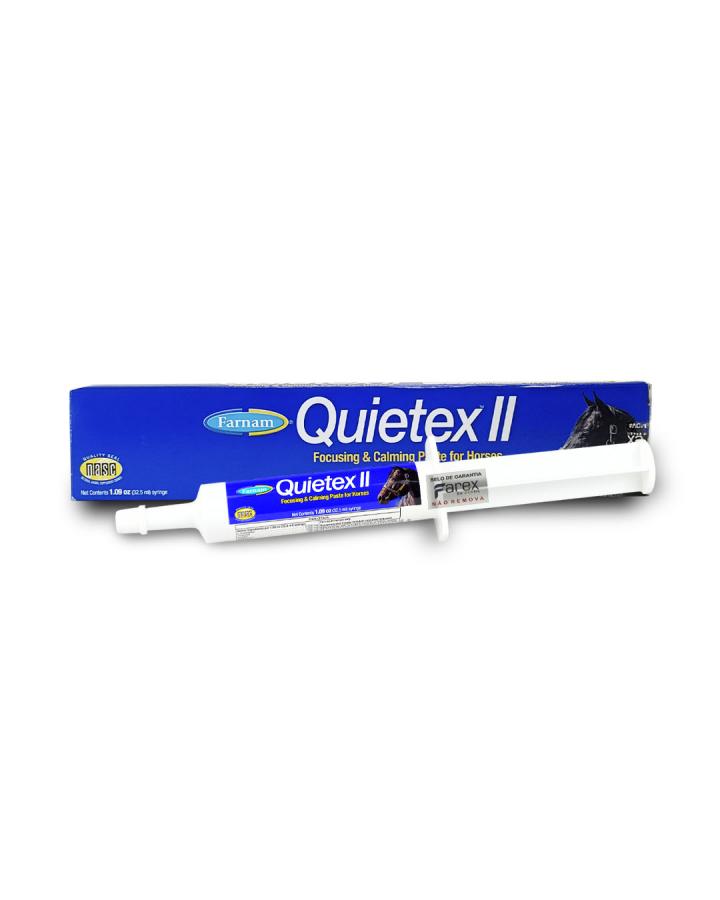



Situations such as breaking-in, transport, and training can negatively impact the mental health of horses, making them restless and agitated, which affects performance in competitions and events. In partnership with Farnam Companies, Farex offers the ideal solution for these cases.
For stressful situations such as: breaking, training, events and competitions, dressage, jumping, racing, and morphological contests. Transport, fairs, and exhibitions. First experiences, particularly with young horses, shoeing, veterinarian and/or dentist visits. Major changes such as a new stable or any other stressful situation for the horse, or any occasion when the animal is being tested and its performance and abilities may be impaired by nervousness and anxiety.
Administer one full syringe 2 hours before the event, and, if necessary, every 8 hours thereafter, or as instructed by a veterinarian.
Sold in boxes of 12 units or individually. Each syringe contains 32.5g.
Each 100g contains:
| L-Tryptophan (mín.) | 81 g/kg |
| Thiamine (mín.) | 32,3 g/kg |
| Inositol (mín.) | 32,3 g/kg |
| Magnesium (mín.) | 13 g/kg |
| Vitamin B6 (mín.) | 13 g/kg |
| Valerian Extract (mín.) | 1,2 g/kg |
When there's a change in routine, horses tend to become more tense. Their prey drive is activated, and their senses become heightened. This makes them nervous or stressed, as well as easily distracted. All this agitation and irritability can affect and complicate their performance in training or competitions. In addition to the psychological impact and unwanted behavioral changes, stress causes several physical illnesses whose treatment is complex and slow. Constipation, diarrhea, irritability, gastritis, colic, among others, are examples of problems that affect horses suffering from frequent stress.
Unfortunately, it's a common problem among competition horses. Seemingly simple actions, such as shoeing, veterinarian/dentist visits, transportation, or even loading the horse into a trailer, can become very complicated and sometimes dangerous handling maneuvers.
The QUIETEX PASTA formula was developed to regulate the horse's central nervous system without affecting its focus, performance, or concentration. L-tryptophan acts on the nervous system, helping to regulate mood. Thiamine plays a role in the production of neurotransmitters, such as acetylcholine, which are important for communication between nerve cells.
Inositol regulates the action of neurotransmitters such as serotonin, dopamine, and GABA, significantly contributing to the transmission of signals between neurons. Magnesium plays a role in the transmission of nerve impulses and muscle contraction, including muscle relaxation. Vitamin B6 is important for the formation of neurotransmitters.
Before we list the formula's main ingredient, Valerian, we need to talk about GABA, an important inhibitory neurotransmitter in the central nervous system. It works by reducing neural activity, acting as a brake to prevent the brain from becoming overstimulated.
When GABA is metabolized, it is automatically transformed into other substances in the body. This process involves enzymes that break down GABA, and the resulting products are used in various metabolic pathways.
The Valerian contained in QUIETEX PASTA has a mechanism of action that consists of inhibiting the enzyme that metabolizes GABA in the brain. QUIETEX PASTA provides a calming effect without causing drowsiness or apathy, and it does not affect performance or responsiveness during work.